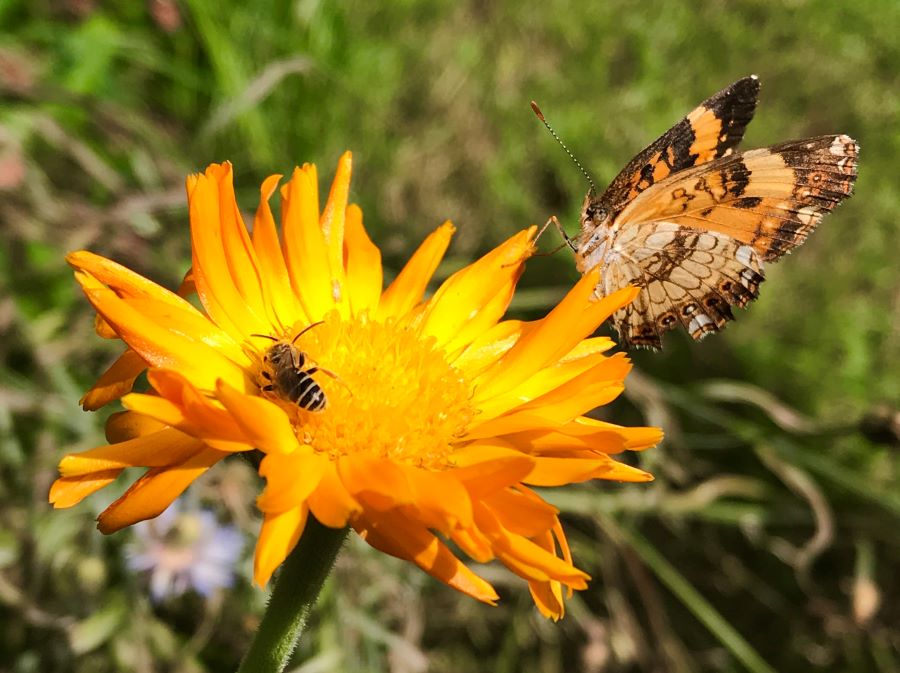
Create a garden home for birds, bees, and butterflies to support a sustainable environment
Gardens are not only pretty to look at, they can also help sustain our ecosystem by serving as a home for pollinators.
What are pollinators? They are birds, bats, bees, butterflies, beetles, and other small animals that pollinate and help plants reproduce. According to the U.S. Department of Agriculture, almost 80% of the 1,400 crop plants grown around the world require pollination by animals.
Other environmental benefits of pollination include:
- Clean air: pollinators help produce flowering plants and trees that in turn produce breathable oxygen by reducing carbon dioxide in the air.
- Purifying water: flowering plants help to purify water and prevent erosion. Without plants, the water cycle would deteriorate, and without pollinators, plants would not grow and reproduce.
To celebrate Pollinator Week, we recommend creating a natural garden that attracts pollinators. Here are a few tips to get you started.
Build a habitat. To provide for a pollinator’s well-being, think of your garden as a habitat! Incorporate flowering plants into your landscape and vegetable garden for year-round bloom. You can also provide a habitat for different phases of a pollinator’s life. For example, many native bees are solitary nesters in twigs and holes in wood or they nest underground in burrows, so leave some bare ground for nesting. And bushy plants that the larvae of butterflies and moths can feed on will allow the adults to lay eggs in your garden. Tolerating a little mess in your garden will greatly benefit not only your plants, but the pollinators that keep them growing.
Use native plants. Native plants are recognizable to native insects and attract more pollinators. Plants from the daisy, mint, and carrot families are great foods, herbs, and flowers that we can enjoy and are attractors for bees, ladybeetles, and other pollinators. Also, choose a variety of plants that will provide nectar and pollen throughout the growing season.
Reduce or eliminate pesticides. Pesticides, synthetic fertilizers, and herbicides can not only have a detrimental effect on soil, they can also be harmful to pollinators. Here’s what we recommend for controlling pests and weeds while protecting pollinators:
Pests:
- Remove pests by hand or with traps. Handpicking and trapping pests can be very effective, especially against larger bugs and pests. Sticky paper traps help with flying pests, while beer traps are useful at preventing slugs.
- Introduce other beneficial critters like lady bugs, you can sometimes find them at your local hardware store.
- Use organic pesticides only if necessary and remember to wear appropriate safety gear and follow product instructions.
- Safely dispose of full or partially full pesticides at a hazardous waste drop-off site.
Weeds:
- Identify what type of weed you have. The King County Noxious Weed Control Program has a weed identification resource with tips to get you started.
- After removing weeds, putting down a biodegradable papery layer like cardboard followed by a thick layer of mulch can further help suppress weed growth.
- Do not use vinegar or salt to control weeds. Despite being “natural,” they are bad for soil health and structure, which can hurt your desirable plants and make weeds in your lawn and garden even worse.
- Use herbicides only if other weed control methods have not worked and remember to wear appropriate safety gear and follow product instructions. If you can, time your weed control to be before flowers appear or after they have wilted to reduce the risk of harming pollinators.
- Safely dispose of full or partially full herbicides at a hazardous waste drop-off site.
For more information on creating a natural garden for pollinators, visit the Garden Hotline website or call 206-633-0224 for expert help with gardening questions. The Garden Hotline is free to home gardeners and landscape professionals throughout Seattle and King County, and offers individualized solutions to garden programs that are practical, safe, effective, and natural.